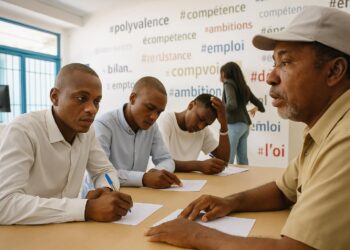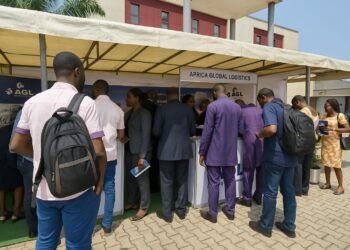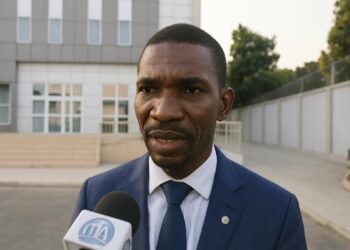Data skills anchor Congo’s development agenda
The opening whistle of the 2025-2026 entrance examination rang out in Brazzaville on 24 September, marking another milestone in Congo-Brazzaville’s quiet race to build a domestic data elite for evidence-based policy.
Minister of Economy, Plan and Regional Integration Ludovic Ngatsé joined Higher Education counterpart Edith Delphine Emmanuel at the Lycée de la Révolution to launch the two-day test for the National Centre for Training in Statistics, Demography and Planning, known as CNFSDP.
From Pointe-Noire to Ouesso, 645 science graduates settled into identical mathematics, French essay and text-summary papers, competing for coveted seats that promise both technical mastery and accelerated career tracks within the civil service and beyond.
The programme was inaugurated last year with 70 students, most of whom are now completing foundational courses in probability theory and national accounting, giving current candidates an early glimpse of campus life and employment prospects.
A rigorous nationwide selection process
The contest unfolds simultaneously in five testing centres: Brazzaville, Pointe-Noire, Dolisie, Owando and Ouesso, a format designed to reduce travel costs for families and to widen geographic access to what officials describe as a strategic profession.
Brazzaville alone fields 570 candidates, including 407 vying for the three-year bachelor track in statistics and planning and 163 eyeing the two-year higher technician diploma, underscoring the capital’s magnetic pull on young talent.
Candidates sit four timed papers over forty-eight hours: Mathematics I, Mathematics II, a French dissertation and a text contraction exercise that tests synthesis skills prized in policy drafting.
Scripts will be scanned and archived for digital retrieval, part of a broader shift toward e-governance that the Ministry of Economy hopes will eventually allow online registration and computer-based testing.
Supervisors from both ministries insist that anonymised scripts and double marking preserve meritocracy, while security officers deployed in corridors deter leaks in a country keen to showcase institutional credibility to regional partners.
Gender momentum and regional equity
Female participation reaches an estimated 40 percent this year, a ten-point rise on the inaugural 2024 session and a signal that STEM outreach campaigns in secondary schools may be gaining traction, according to Emmanuel.
The geographic spread of testing centres also matters: candidates from forested Sangha or oil-rich Kouilou can now compete without crossing the country, aligning with government promises to decentralise opportunity and to curb urban migration.
Stakeholders also emphasise inclusivity for people with disabilities; Braille papers and adapted seating were introduced for the first time, drawing praise from advocacy groups.
Officials hint that future cohorts could include targeted scholarships for young women and applicants from underserved districts, a move donors say would strengthen the statistical system’s social licence.
Curriculum tailored for strategic sectors
Once admitted, students embark on a curriculum that blends advanced econometrics, demographic analysis and geospatial modelling with soft skills in public speaking and ethics, mirroring standards at Yaoundé’s ENSAE or Dakar’s ENSEA, regional flagships.
The CNFSDP, created in 2023 on the former Centre d’Application de la Statistique et de la Planification, operates under administrative public status, enabling flexible partnerships with international agencies and private firms needing big-data talent.
Graduates are expected to feed national accounts, census operations and sector dashboards in health, agriculture, energy and climate, filling gaps highlighted during recent IMF Article IV consultations.
Ngatsé calls data the new raw material, arguing that reliable indicators can de-risk investment, sharpen project appraisal and unlock concessional climate finance inside the Congo Basin.
Financing remains modest: the centre operates on a budget of roughly 1.2 billion CFA francs, sourced from the national treasury and a technical assistance grant managed by the African Development Bank.
Implications for investors and partners
For investors, a stronger statistical apparatus reduces informational asymmetry, a perennial hurdle in frontier markets where project pipelines and debt levels are often opaque.
Development partners eyeing results-based financing schemes likewise welcome the initiative; World Bank staff privately note that disbursement triggers rely on agreed data sets that domestic teams must own rather than outsource.
Private conglomerates in mining and telecoms have signalled interest in sponsoring research chairs, seeing value in real-time dashboards that can guide supply-chain optimisation and market segmentation.
The diaspora, often hesitant to return, could find an entry point through guest-lecturer slots or remote mentorship programs now being designed, according to CNFSDP management.
Ultimately, the 645 hopefuls symbolise a broader wager: that investing early in analytical capacity can accelerate the Republic’s inclusive growth trajectory while reinforcing confidence among creditors, citizens and regional peers.
Whether or not every applicant succeeds, officials stress that the competition itself lifts mathematical standards nationwide, creating a virtuous loop between secondary syllabi and higher-education demands.
Against a regional backdrop of digital transformation, Congo-Brazzaville’s decision to professionalise statistics education sends a confident message that the Republic intends to own its numbers and, by extension, its narrative in continental policy circles and global development forums.












































